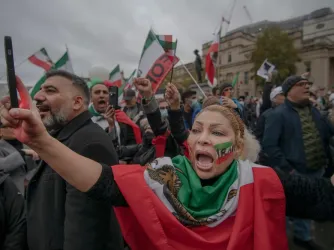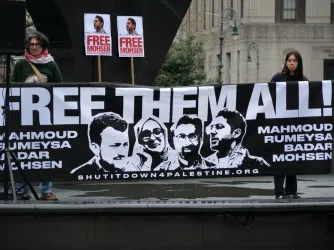Table of Contents
‘Naive Statism’ and how the Rwandan genocide was not about Rwanda’s excessive commitment to free speech: Part 18 of answers to arguments against free speech from Nadine Strossen and Greg Lukianoff

In May 2021, I published a list of “Answers to 12 Bad Anti-Free Speech Arguments” with our friends over at Areo. The great Nadine Strossen — former president of the ACLU from 1991 to 2008, and one of the foremost experts on freedom of speech alive today — saw the series and offered to provide her own answers to some important misconceptions about freedom of speech. My answers, when applicable, appear beside hers.
In this series:
- Part 1: Free speech does not equal violence
- Part 2: Free speech is for everyone
- Part 3: Hate speech laws backfire
- Part 4: Free speech is bigger than the First Amendment
- Part 5: You can shout ‘fire’ in a burning theater
- Part 6: Is free speech outdated?
- Part 7: Does free speech assume words are harmless?
- Part 8: Is free speech just a conservative talking point?
- Part 9: Free speech fosters cultural diversity
- Part 10: Why 'civility' should not trump free expression
- Part 11: ‘New’ justifications for censorship are never really new
- Part 12: Free speech isn’t free with a carveout for blasphemy
- Part 13: Does free speech lead inevitably to truth?
- Part 14: Shouting down speakers is mob censorship
- Part 15: Is counterspeech the best answer to bad speech?
- Part 16: Would censorship have stopped the rise of the Nazis?
- Part 17: Censorship won’t cure disinformation (featuring Jacob Mchangama)
- Part 18: ‘Naive Statism’ and how the Rwandan genocide was not about Rwanda’s excessive commitment to free speech
Greg Lukianoff: Given the panic this spring over what Elon Musk buying Twitter may mean for hate speech regulation on the platform, I thought it would be important to explain that arguments for hate speech codes are deeply flawed. As we have previously argued in this series, hate speech laws have proven to backfire in predictable and unpredictable ways. In this and a previous entry we address oft-cited arguments that hate speech laws would have prevented historical atrocities.
Assertion: The Rwandan genocide, which was famously carried out “with a machete in one hand and a radio in the other,” demonstrates why we should censor hate speech.
Greg Lukianoff: Richard Delgado, an early champion of campus speech codes and now more famous as a founding scholar in the field of Critical Race Theory, cites the Rwandan genocide, along with Weimar Germany, as cautionary tales against free-speech purism. The problem is that neither historical example supports the idea that speech restraints could have prevented a genocide.
As I explain in my review of Eric Berkowitz’s excellent book, “Dangerous Ideas: A Brief History of Censorship in the West, from the Ancients to Fake News,” in the case of the Rwandan genocide, the problem wasn’t excessive commitment to free speech, but rather a government-led criminal conspiracy to commit genocide, and the infamous genocidal radio broadcasts would not have amounted to protected speech.
Here are two key points missed by those who blame the Rwandan genocide on free speech:
The speech at-issue during the Rwandan genocide would have been unprotected in virtually any country in the world. Even in the U.S., it would have met the test for unprotected incitement. The First Amendment and its associated case law are the strongest legal codification of the freedom of expression in the world today. Even so, the Supreme Court has defined several narrow exceptions to the freedom of expression, including defamation, fighting words, harassment, obscenity, and true threats. In the United States, since the 1969 Supreme Court decision, Brandenburg v. Ohio, speech advocating a crime loses constitutional protection when it is 1) directed at producing imminent lawless action, and 2) likely to produce such action.
Radio broadcasts during the Rwandan genocide, which frequently included names, addresses, and current locations of Tutsis, encouraged and provided the means for murders, easily clearing the Brandenburg test. It is, then, totally unclear how the Rwandan genocide illustrates that the First Amendment’s permissiveness of speech goes too far. Like Weimar Germany before the Nazis, Rwandan speech wasn’t free to begin with: Radio stations were not permitted to operate if the government disagreed with their viewpoints and, once the genocide started, both the official state radio station and its nominal opponents were directly controlled by pro-government forces. To use the authorized media of a genocidal state as evidence of the danger posed by excessive liberty suggests a failure to understand the core concept of liberty.
The idea that the passage of hate speech laws would have somehow prevented the Rwandan government from carrying out the genocide amounts to “naive statism.” Murder, especially indiscriminate mass murder, was illegal in Rwanda, but illegality does not matter when the government and police are controlled by those who have no regard for the law. As was the case with Nazi Germany, the proximal issue was not speech, but state-sanctioned mass murder.
Like many anti-free speech stances, the claim that too much free speech caused the Rwandan genocide shows a bizarrely unrealistic understanding of politics and political power. Put simply, if the government would not enforce laws against murdering Tutsis, there is simply no reason to believe it would have enforced laws against hate speech targeting Tutsis.
A recurrent bad argument against freedom of speech involves a kind of magical thinking by which the passage of a speech restriction eliminates a problem, without contending that any law has to be passed and enforced by actual people. I call this view “naive statism.” Those who believe that hate speech laws would have prevented the rise of the Nazis in Weimar Germany tend to ignore the fact that the existing hate speech limitations were enforced by people who voted for Nazis in large numbers and by judges who refused to seriously punish people like Hitler. In Rwanda, the naive statism argument for censorship laws ignores the fact that the Rwandan genocide was, of course, illegal even by Rwandan law. If those in charge of the government are orchestrating a genocide, a law banning hate speech is a silly, dismissible barrier — a shield as thick and sturdy as the parchment it’s written on.
Nadine Strossen: The 1994 Rwandan genocide — in which members of the ethnic majority, Hutus, slaughtered an estimated 500,000-800,000 members of the Tutsi ethnic minority — is often cited as allegedly demonstrating that we should punish hateful expression that falls short of posing the kind of emergency that justifies punishing it under modern U.S. law. This argument reflects the widespread conventional wisdom that hateful speech about Tutsis had a sufficient causal connection to the mass murders, which is captured in former U.S. ambassador to the United Nations Samantha Power’s widely quoted soundbite that the killers “carried a machete in one hand and a transistor radio in the other.” She was referring to broadcasts by RTLM (Radio Television des Mille Collines), which was owned and controlled by Hutu hardliners. In fact, though, far from showing that non-emergency hate speech restrictions are needed to prevent discriminatory violence and foster unity, the actual evidence about the Rwandan situation undermines those conclusions.
Much of the problematic expression involved in the Rwandan genocide did satisfy the emergency principle because it directly, imminently, and materially contributed to genocidal violence. This expression not only intentionally incited genocide of Tutsis in general, but also provided essential information that facilitated the murders of specific Tutsis. RTLM broadcasts listed the names of particular Tutsis who should be killed, and provided directions to their hiding places. For these reasons, the International Criminal Tribunal for Rwanda (ICTR) convicted RLTM and two of its leaders of international crimes. Moreover, the ICTR found that one of these leaders had “ordered the murders of Tutsi civilians.” Punishing this kind of expression is fully consistent with First Amendment principles.
But what about other expression, which fell short of intentional incitement or direct facilitation of genocide, but nevertheless conveyed hateful views about Tutsis? Did this type of expression contribute sufficiently to the genocide to be punished? The ICTR’s Appeals Chamber upheld the conviction of one RTLM principal, Ferdinand Nahimana, on this ground, but one judge dissented from that holding, which also has been criticized by other international human rights experts. The dissenting judge, Theodor Meron, noted that “the Appeals Chamber. . . has marshaled no evidence” that “establish[es] a causal nexus between Nahimana’s” expression and the genocide. As I will discuss further below, multiple social scientists and human rights experts have concurred with Judge Meron’s conclusion. First, though, I will discuss another important aspect of Judge Meron’s dissent, which flags additional reasons not to punish hate speech except in accordance with the emergency principle.
While deploring Nahimana’s “repugnant” hate speech, Judge Meron stressed the negative human rights ramifications of punishing it absent a tight causal connection to the genocide. Judge Meron stressed the negative impact that non-emergency hate speech restrictions would have on the rights of ethnic and political minority groups in particular — ironically, the very kinds of groups who were massacred in the Rwandan genocide. This concern was raised by a friend-of-the-court brief filed by the Open Society Justice Initiative, an international human rights organization, along with 11 other human rights organizations from multiple countries, all over the world:
The reason for protecting hate speech . . . is [to] enabl[e] political opposition, especially in emerging democracies. [A]micus curiae. . . has brought to the Tribunal’s attention numerous examples of regimes’ suppressing criticism by claiming that their opponents were engaged in criminal incitement [through hate speech]. Such efforts at suppression are particularly acute where political parties correspond to ethnic cleavages….[R]egimes often charge critical journalists and political opponents with. . . “incitement to hatred.”…. [O]fficials in some countries have explicitly cited the example of RTLM in order to quell criticism of the governing regimes.
Tragically, these general downsides of non-emergency hate speech restrictions have been of increasing concern in Rwanda itself, in the wake of such laws that it passed for the professed purpose of reconciling Rwandans and preventing another catastrophe similar to the 1994 genocide. This legislation, which has been criticized by international human rights organizations, imposes broad, vague restrictions on expression that constitutes “Divisionism” or “Genocide Ideology.” A 2015 report by a German foundation, the Friedrich-Ebert-Stiftung, concluded: “In Rwanda, hate speech legislation has become a tool of repression.”
A 2010 Amnesty International report documents that this legislation has been “officially interpreted” as punishing, “for example, general opposition to government policies, the support of political candidates who are not part of the governing RPF [the Tutsi-led Rwandan Patriotic Front], calls for prosecution of unpunished RPF war crimes, criticism of the lack of media freedom and comments on the deficiencies of the hate speech laws themselves.”
Another counterproductive aspect of Rwanda’s non-emergency hate speech restrictions is that, far from countering divisiveness, they actually foster it. Amnesty International has documented that “denunciation” and “false accusations” under the law are used to settle personal and political disputes. Sadly, “[m]any false accusations take place during the genocide commemoration period when tensions are particularly acute.” The Friedrich-Ebert-Stiftung report concluded: “Despite the stated aim to foster unity, the laws are more likely to lead to an even deeper split in an already traumatized society. They have themselves become a tool that fuels further conflict instead of preventing it.”
In the years since the 1994 Rwandan genocide, multiple experts have studied the causal factors in general, and the role of RTLM and other expression in particular. While some conclude that expression did play a material contributory role, others disagree, and are highly critical of the ICTR’s conclusions on this issue. For example, on the basis of 100 interviews of convicted perpetrators, Rwandan cultural anthropologist Charles Mironko found that many ordinary villagers either did not receive genocidal radio transmissions or did not interpret them as encouraging killing.
Political scientist Scott Straus undertook a quantitative analysis of radio reception and genocidal violence and noted the following flaws in the assumed role that RTLM played: RTLM’s coverage at the time was very uneven, especially in rural areas, where it was unable to reach a full 90-95% of the population; only 10% of the population owned a radio in 1994; the initial violence did not correspond with areas of broadcast coverage; and the most extensive and inflammatory broadcasts came after most of the killings had already taken place. Although Straus acknowledged that RTLM had “marginal and conditional” effects, including likely convincing a small number of people to commit violence, he also concluded that “radio alone cannot account for either the onset of most genocidal violence or the participation of most perpetrators.”
One further expert who concluded that RTLM did not incite the genocide is Richard Carver, an expert on Africa who worked for both Amnesty International and Human Rights Watch, who stated that “[t]he massacres would have taken place with or without the RTLM broadcasts.”
Professor Straus has pointed out the following irony: the widespread willingness to attribute Rwandan Hutus’ participation in genocide to their purported susceptibility to expression conveying negative stereotypes about Tutsis itself reflects negative stereotypes about Rwandan Hutus or Rwandans in general. He explained: “The Rwandan public is often characterized as hearing a drumbeat of racist messages and directly internalizing them or as hearing orders to kill and heeding the command. Those views are consistent with stereotypes about Rwandans, namely that they obey orders blindly, that they are poorly educated and thus easily manipulated, and that they are immersed in a culture of prejudice.”
In sum, the Rwandan situation illustrates that non-emergency hate speech restrictions do more harm than good: They would not clearly prevent a future Rwandan genocide, but they do clearly stifle dissident and minority group speech, while fueling divisiveness.
Recent Articles
Get the latest free speech news and analysis from FIRE.

The American people fact-checked their government

Facing mass protests, Iran relies on familiar tools of state violence and internet blackouts

Unsealed records reveal officials targeted Khalil, Ozturk, Mahdawi solely for protected speech
